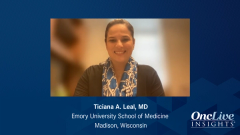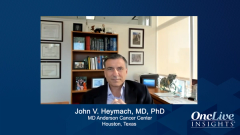
Is There a Role for IO Therapy in NSCLC With Classical EGFR Mutations or ALK Rearrangements?
Insight on the outcomes seen with immunotherapy in non–small cell lung cancer with classical EGFR mutations or ALK rearrangements in the context of clinical study data.
Episodes in this series

Transcript:
Meghan J. Mooradian, MD: Similar to how targeted therapies really changed the game in terms of treating advanced non–small cell lung cancer, there was a lot of enthusiasm understandably for the use of immune checkpoint inhibition over the last 5 to 10 years. However, we know that immune checkpoint inhibition does not work for all of our molecular subtypes. I think an important question that we had had was, was there a rule for PD1[programmed cell death protein 1] inhibitors in the treatment of non–small cell lung cancer with some of these oncogene-addicted cancers, such as EGFR-mutated or ALK-rearranged lung cancer. At this point in time, we’ve had multiple studies both in the first- and second-line setting, which has really demonstrated inferior outcomes when we use immunotherapy in EGFR and ALK-mutated lung cancer. Currently, NCCN [National Comprehensive Cancer Network] guidelines really note that there’s a contraindication for treatment with PD1 or PD-L1 [programmed death-ligand 1] inhibitors for patients with activating EGFR and ALK-rearranged lung cancer, as we know studies have shown a predicted lack of benefit.
There have been several studies looking at the role of immune checkpoint inhibition in cases of EGFR-mutated lung cancer and ALK-rearranged non–small cell lung cancer. Initially many of these reports were retrospective. One such report performed by Dr Justin Gainor and colleagues at Massachusetts General [Boston, MA], looked at ALK and EGFR-mutated lung cancer treated with immune checkpoint inhibition. They compared a group of patients, wild-type. What they found is that there was quite minimal to little response in the EGFR and ALK groups. Only 1 of 28 patients had a response vs a 23% response rate in wild-type patients. Some of the interesting correlative data that they were able to perform on archival tumor tissue really seemed to speak to the fact that these patients with EGFR- and ALK-mutated lung cancer had low CD8 tumor-infiltrating lymphocytes as one potential explanation for why immunotherapy was insufficient and often inferior. There have been other studies in this space. One large retrospective study was the immunotherapy target study, really trying to assess the role and efficacy of immune checkpoint inhibition with PD1/ PD-L1 inhibitors across different molecular subtypes. These subtypes included KRAS, BRAF, ROS1, MET, EGFR, HER2, RET, and ALK. What they found is if you removed the KRAS population, which had an overall response rate of close to 25%, most of these other targetable mutations had response rates of 20% or less. Really, again, speaking to the fact that immune checkpoint inhibition does not seem to confer the same benefit in many of these oncogene-addicted lung cancers in comparison to wild-type. There’s been some additional data that’s really tried to look at the EGFR-mutant population. There was a meta-analysis published in JTO [Journal of Thoracic Oncology], which looked at 3 randomized studies. They did not see any overall survival benefit to immunotherapy compared to second-line chemotherapy. In EGFR-mutant lung cancer population, notably, there was a phase 2 study that was looking at pembrolizumab [Keytruda] in TKI [tyrosine kinase inhibitor]-naive patients with an activating EGFR mutation. These patients had a PD-L1 tumor proportion score greater than or equal to 1%. The study actually closed early after they saw no responses in the first 11 patients. This has been a similar experience in ALK-rearranged lung cancer so, at this point in time, we have a mountain of data to suggest that immune checkpoint inhibition should not be used and the first- or second-line targeted therapy should be prioritized for patients, particularly those with ALK and EGFR.
With ample data suggesting inferiority of immune checkpoint inhibition in patients with EGFR-mutated and ALK-rearranged lung cancer, we are currently in a position where most clinicians are favoring the use and exhaustion of targeted therapies followed by chemotherapy, and then often the hope would be to enroll in a clinical trial. Though there is the potential to use immunotherapy in these patients in later lines, most clinicians would advocate for a clinical trial in this sphere. I think one thing that’s also important to know is that clinical studies have tried to explore the use of combination tyrosine kinase inhibitor with immunotherapy to assess is there any additional benefit when these 2 different modalities are combined. Importantly, particularly in EGFR and ALK, many of these studies had to be closed early due to toxicity. At this point in time, there are no ongoing efforts really to look at combination EGFR or ALK-directed tyrosine kinase inhibitors with immunotherapy.
Transcript edited for clarity.







































